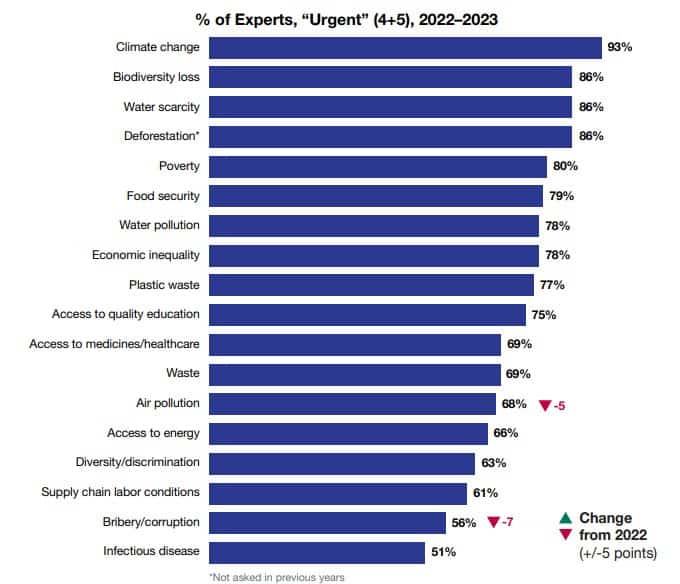The latest research from GlobeScan and the SustainAbility Institute by ERM finds that sustainability leadership increasingly requires going beyond compliance towards developing innovative business models with sustainability at their core.
Legislative actions, standardisation of sustainability-related disclosures, the COP15 biodiversity framework and business actions are also recognised as pivotal sustainability developments over the last 12 months.
The GlobeScan / SustainAbility Survey: 2023 Sustainability Leaders Asia Pacific highlights
Key developments on the sustainability agenda: Asia-Pacific’s sustainability leaders viewed legislation and business action towards sustainability (14%) as the most significant positive development. This is followed by sustainability disclosure standards (11%) and renewables and carbon-related developments (10%).
What makes sustainability leadership: Integrating sustainability into business models and strategy ranked as the most important driver for corporate sustainability leadership (27%), which is consistent with counterparts’ views from Europe, North and Latin America. Evidence of impact and action (17%) and setting ambitious targets (16%) are also key factors in demonstrating leadership.
Corporate sustainability leaders in Asia-Pacific: Mahindra & Mahindra rose from third place last year to clinch the top spot as the region’s corporate leader in sustainability. City Developments Ltd. and PTT Global tie for second place, while Tata has dropped from leading the pack in 2022 to fourth place. Other notable corporate sustainability leaders include Charoen Pokphand Group, Samsung, Swire, Toyota, Kao and SCG.
Urgency of sustainable development challenges and recent breakthroughs

Source: GlobeScan-SustainAbility Survey 2023
Ninety-three per cent (93%) of sustainability experts continue to rank climate change as the most urgent challenge. Deforestation was included in the survey for the first time in 2023 and ranks among the top five most urgent issues (86%). Other issues ranking consistently high in urgency over the past five years include biodiversity loss (86%), water scarcity (86%), and poverty (80%).
Globally, sustainability experts point to a range of new sustainability legislation such as the Inflation Reduction Act (IRA) and EU Green Deal (mentioned by 25%), disclosure standards (13%), and the COP15 biodiversity agreement (10%) as most significant. Other highlighted developments include recent actions and commitments by businesses (9%) and the rise of green financing (7%).
Mark Lee, director of the SustainAbility Institute by ERM said: “Companies are increasingly integrating sustainability into their business strategies and are recognised as leaders for doing so. This year’s leader, Patagonia, has taken the integration of sustainability to an unprecedented level by channelling all profits to nature and climate action. The bar for sustainable business continues to rise, and corporates will need to keep pushing boundaries to maintain their status as leaders.”
Chris Coulter, CEO of GlobeScan said: “Government is back when it comes to sustainability! Stakeholders point to new legislation and disclosure rules as the most important breakthroughs in the sustainability agenda in the past year.”




